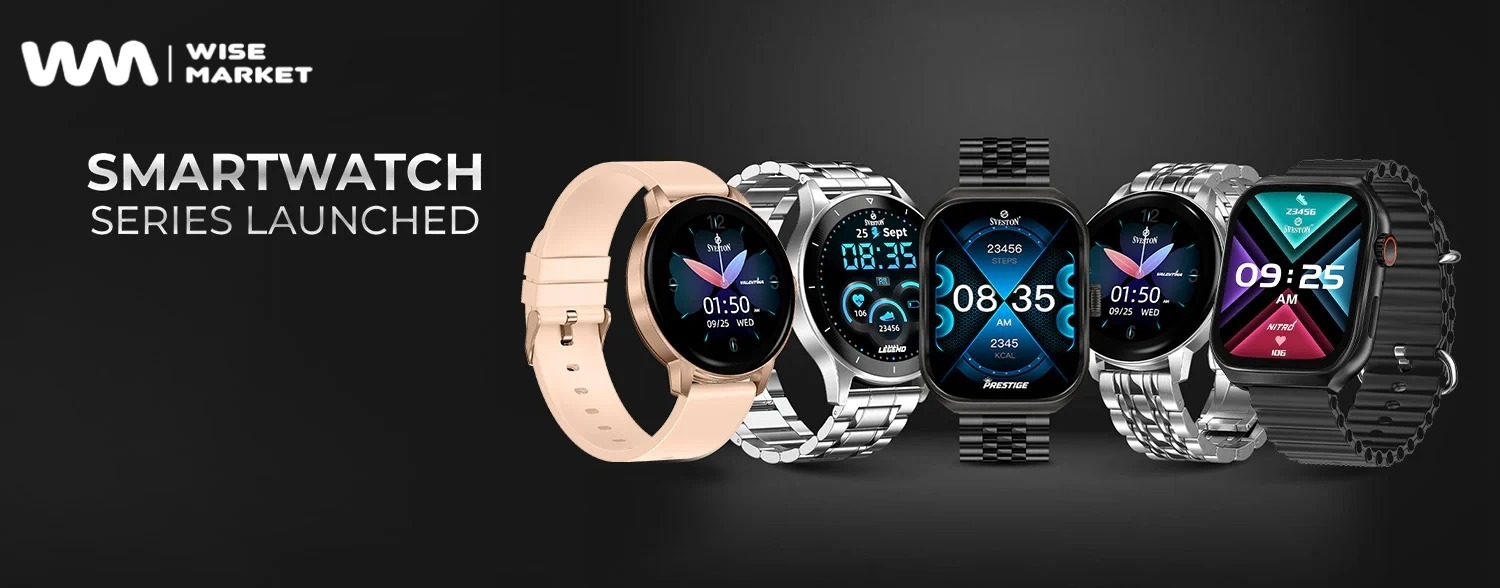Technology has been occupied with an inseparable place in the ever-developing field of sports and fitness. One such breakthrough device is smartwatches, which have given athletes and fitness enthusiasts a different way to train, control their performance, and reach their goals. Such wearables provide numerous features in other sports and training directions and are therefore much needed by any class of athletes wishing to gain better athletic performance. This all-around blog will look at ten such uses of smart watches in sporting activities and training, thereby showing how these devices are making a difference in the lives of athletes at all levels. Let us learn more about smartwatches!
1. Real-Time Performance Monitoring Smart Watches
The most important benefit associated with smartwatches is that they can monitor performance in real time. This feature becomes very important for athletes who want to monitor progress and make data-driven decisions throughout the workout.
Heart Rate Tracking
Smartwatches are fitted with advanced sensors that can track heart rate continuously during exercise. These data help understand how well you perform in terms of cardiovascular performance, hence staying within your target heart rate zone for optimum training. Checking the heart rate helps one stay energised, thus reducing the potential chances of injury.
GPS Tracking
For runners, cyclists, and outdoor enthusiasts, GPS tracking comes in very handy. Smart watches with a built-in GPS can be set to track your run distance, pace, and route accurately; this provides information that gives great insight into performance. This feature will help one in setting new routes and assessing one’s progress over time.
Calorie Burn and Energy Expenditure
Knowing how many calories you have burned after working out is crucial in keeping you on track. Smartwatches can do this by calculating the rate of one’s heartbeat, level of activity, and other factors that give clear information on how much energy one has used up. Hence, this information would help you work on your diet and training accordingly.
Sport-Specific Metrics
These days, smartwatches offer metrics for lots of sports activities, specifically stroke count and efficiency for swimmers, cadence, and power output for cyclists. This allows a closer look at your performance to fine-tune your technique and improve results.
2. Individualized training programs
Not limited to tracking, smartwatches offer individually trained programs at your fitness level and tailored toward your goals.
AI-Powered Workout Suggestions
Many of these watches provide AI-powered features, process performance data, and recommend customised workouts according to your current fitness level. These suggestions intend to ensure that you get the most out of the training sessions.
Adaptive Training Plans
Smartwatches allow you to create dynamic training plans based on your condition and recovery demands. If you cannot finish a workout or feel the need for more recovery, your watch will automatically adjust so that you stay on track. This flexibility will allow you to train consistently without overtraining.
Integration to Professional Coaching Apps
Of course, smartwatches may be combined with professional coaching applications and platforms to get access to expert guidance and customised training plans. This would enable you to receive real-time feedback and make whatever adjustments might be necessary in your training regime.
3. Recovery and Injury
Prevention Recovery is a vital component in every training regime, and smart watches enable features that can ensure you optimise your recovery and prevent injuries.
Sleep Tracking
Quality sleep is essential for athletic performance and recovery. Smartwatches track your sleep, cementing insights into sleep quality and duration. From this data, one is given the chance to make quality decisions about rest and recovery, hence ensuring the restoration through sleep is achieved.
Stress Level Monitoring
Many of these watches can quantify your stress levels during the day to show those periods when high stress could affect training. Some devices have guided breathing exercises for managing stress and promoting relaxation.
Overtraining Detection
This follows a sole implication for overtraining: fatigue, reduced performance, and injury. Recovery metrics and training load are considered in smartwatches when detecting overtraining. Your smartwatch will advise rest days if it feels you are going too hard — to ensure you recover correctly and avoid injury.
4. Biomechanical Analysis
Smartwatches have advanced features regarding biomechanical analysis and may increase the chance of refining your technique to reduce the risks of injury.
Running Form Analysis
Proper form boosts running performance and is also an injury-preventive measure. Smart watches help track all your running forms, including gait, stride length, and cadence. This data, therefore, enables you to make adjustments to your technique, thus saving vital energy and minimising injuries.
Swim Stroke Efficiency
These smart watches would be primarily helpful to swimmers in terms of stroke efficiency and technique. They come with very elaborate metrics on your counts, stroke rate, and even the distance per stroke to identify what to improve in the pool.
Golf Swing Analysis
Using smartwatches, one can analyse the mechanics of the swing to make data-driven adjustments. One such device monitors metrics from swing speed, tempo, and club angle—all good feedback that will help fine-tune techniques for results.
5. Virtual Coaching and Motivation
Staying motivated and receiving expert advice can be the difference between reaching your fitness targets. From virtual coaching to several other motivating features, a smartwatch has got you back to keep moving.
Real-time Audio Coaching
Many smartwatches offer real-time audio coaching during activities, where users are guided on how to proceed and encouraged to put more focus into their activities. This becomes useful, especially for individuals engaged in running and cycling, who opt for real-time feedback regarding their actions and performance.
Milestones and Achievement Badges
Smartwatches will reward you with achievement badges and milestone celebrations. Such rewards really give a sense of accomplishment and motivate one to further work harder towards goals.
Social Sharing and Community Challenges
In addition, smartwatches are a medium through which people share their achievements and can join challenges in the community. Crossing the social element would introduce the possibilities of fun and competition into training, thus keeping one interested and motivated.
6. Nutrition and Hydration Monitoring
Proper nutrition and hydration are essential for healthy performance in athletes, and smartwatches provide tools to monitor dietary intake better.
Water Intake Reminders
Remaining at optimal performance requires that an athlete always stay hydrated, and the smartwatch becomes vital in summoning reminders to maintain the needed water intake at every moment. The reminder will always remind the user of sufficient water intake in a day, especially when deep into training sessions.
Calorie and macronutrient logging
Smartwatches may also be connected with nutrition tracking apps to record macronutrients and calorie intakes. This allows you to sustain a proper diet that aligns with your training objectives.
Recommendations in Pre and Post-Workout Nutrition
With smartwatches, you have on-the-go nutrition suggestions customised based on the workout’s intensity and time duration. These will give you recommendations on what to eat pre- and post-time at the gym to fuel your body for optimal performance and recovery.
7. Environmental Monitoring
Training in various environments is likely to affect your performance, but a smartwatch will offer some features that can assist you in monitoring and adapting to your environment.
Altitude and Air Pressure Monitoring
Monitoring altitude and atmospheric pressure is a feature most useful for mountaineers and hikers. A smartwatch can thereby track this information in an attempt to adapt one to acclimatise to high altitude, keeping altitude-related ailments within the bay in check.
UV Index as well as Temperature Monitoring
If the athlete is performing outside, they need to control the UV index and temperature to ensure they do not get burnt by the sun or develop a temperature-related disorder. The smartwatch will keep you abreast of these environmental factors and allow you to make informed decisions regarding your training.
Air Quality Analysis
Urban runners and cyclists use smart watches to monitor air quality. Monitoring air pollution with such devices and obtaining the real-time pollution level helps a person choose the preferable routes, leading to an area with higher-quality air and less exposure to harmful impurities.
Conclusion
Smartwatches have found serious applications in sports and other forms of training due to their wide range of opportunities for improving overall performance, recovery, and safety. Specifically, in such areas as performance monitoring, environmental monitoring, and provision of virtual coaches for an individually tailored training program, such devices give multiple opportunities for support for athletes at any level.
With rapidly developing technology, smart watches bring limitless potential to sports and training. By adapting to such innovative tools, an athlete can achieve potential and eventually confidently go ahead to achieve fitness goals. Wise Market Australia offers a wide range of smartwatches with a warranty, a money-back guarantee, and free delivery at the best-discounted prices. Do not wait for the stock to end; buy now!
FAQs (Frequently Asked Questions)
1. How do smartwatches help with real-time performance monitoring?
Smartwatches record parameters like heart rate, GPS, and sports-specific data to provide real-time feedback on one’s exercise performance.
2. What kind of personalised training programs can smartwatches offer?
Smartwatches would give smart workout suggestions, adaptive training plans, AI-powered personal information integration with coaching apps, and more that would guide you just right.
3. How can smartwatches help with recovery and injury prevention?
The smartwatch measures sleep, level of stress, and overtraining to optimise recovery and prevent any injuries.
4. What kind of biomechanical analysis can smart watches provide for different sports?
Smartwatches have the added advantage of giving feedback on running forms, swim strokes, and golf swings to optimise technique and performance.
5. What safety and emergency features do smart watches offer for athletes?
Smartwatches have features like fall detection, location sharing, and heart rate anomaly warnings to enhance safety during training and activities.










